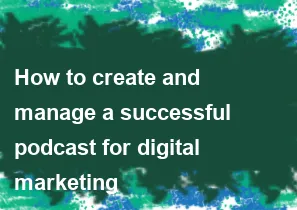How to create and manage a successful podcast for digital marketing

Creating and managing a successful podcast for digital marketing involves several key steps. Here's a comprehensive guide to help you get started:
1. Define Your Purpose and Audience:
- Clearly define the purpose of your podcast and identify your target audience.
- Understand the pain points and interests of your audience to tailor your content accordingly.
2. Plan Your Content:
- Create a content strategy outlining the topics, format, and style of your podcast.
- Plan episodes in advance to maintain consistency and relevance.
3. Choose a Niche:
- Select a niche that aligns with your business and expertise.
- Finding a unique angle within your niche can help you stand out.
4. Invest in Quality Equipment:
- Use a good-quality microphone, headphones, and recording/editing software for professional-sounding content.
- Consider an acoustic setup to reduce background noise.
5. Create Compelling Artwork and Branding:
- Design eye-catching podcast artwork that reflects your brand.
- Consistent branding across platforms helps build recognition.
6. Host and Publish:
- Choose a reliable podcast hosting platform (e.g., Libsyn, Podbean, or Anchor).
- Ensure your podcast is available on major directories like Apple Podcasts, Spotify, Google Podcasts, etc.
7. Optimize for SEO:
- Use relevant keywords in your podcast title, description, and episode titles.
- Encourage listeners to leave reviews, as they can improve your podcast's visibility.
8. Promote on Social Media:
- Leverage social media platforms to share podcast updates, snippets, and engage with your audience.
- Create visual content, such as audiograms, to grab attention.
9. Collaborate and Network:
- Collaborate with influencers, experts, or other podcasters to expand your reach.
- Attend industry events or join podcasting communities to network.
10. Consistency is Key:
- Stick to a regular release schedule to build a loyal audience.
- Consistency helps establish trust and keeps listeners engaged.
11. Engage with Your Audience:
- Respond to comments and messages from your audience.
- Consider featuring listener questions or feedback in your episodes.
12. Measure and Analyze:
- Use analytics tools provided by your hosting platform to track listener metrics.
- Analyze data to understand what works and refine your approach accordingly.
13. Monetize Your Podcast:
- Explore monetization options such as sponsorships, affiliate marketing, or premium content.
- Ensure any promotions align with your brand and provide value to your audience.
14. Stay Informed and Adapt:
- Keep abreast of industry trends and changes in the podcasting landscape.
- Adapt your strategy based on feedback and evolving market conditions.
15. Legal Considerations:
- Understand copyright laws, licensing, and permissions for any content you use.
- Consider legal protections for your podcast, such as trademarking.
16. Evaluate and Improve:
- Regularly assess your podcast's performance and audience feedback.
- Identify areas for improvement and implement changes accordingly.
By following these steps, you can create and manage a successful podcast for digital marketing, building a valuable asset for your brand and engaging with your target audience effectively.
-
Popular Post
- How to optimize for Google's About This Result feature for local businesses
- How to implement multi-language support in an Express.js application
- How to handle and optimize for changes in mobile search behavior
- How to handle CORS in a Node.js application
- How to use Vue.js with a UI framework (e.g., Vuetify, Element UI)
- How to configure Laravel Telescope for monitoring and profiling API requests
- How to create a command-line tool using the Commander.js library in Node.js
- How to implement code splitting in a React.js application
- How to use the AWS SDK for Node.js to interact with various AWS services
- How to use the Node.js Stream API for efficient data processing
- How to implement a cookie parser middleware in Node.js
- How to implement WebSockets for real-time communication in React
-
Latest Post
- How to implement a dynamic form with dynamic field styling based on user input in Next.js
- How to create a custom hook for handling user interactions with the browser's device motion in Next.js
- How to create a custom hook for handling user interactions with the browser's battery status in Next.js
- How to implement a dynamic form with dynamic field visibility based on user input in Next.js
- How to implement a dynamic form with real-time collaboration features in Next.js
- How to create a custom hook for handling user interactions with the browser's media devices in Next.js
- How to use the useSWRInfinite hook for paginating data with a custom loading indicator in Next.js
- How to create a custom hook for handling user interactions with the browser's network status in Next.js
- How to create a custom hook for handling user interactions with the browser's location in Next.js
- How to implement a dynamic form with multi-language support in Next.js
- How to create a custom hook for handling user interactions with the browser's ambient light sensor in Next.js
- How to use the useHover hook for creating interactive image zoom effects in Next.js